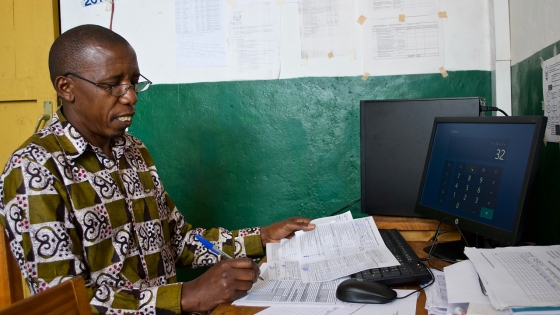Monitoring & Evaluation
Our approach to digital health assessments focuses on end-to-end translational research. It encompasses a range of methodologies, from developing user-centered prototype testing tools and conducting cognitive testing to running large-scale effectiveness, implementation, and cost-effectiveness studies.
Examples of our work include implementation research evaluating efficiency in the real world scenario, and assessing scalability for decision support.

GregoryJamesWatson, CC BY-SA 4.0, via Wikimedia Commons
Relevant Projects
Advancing Quality Care for Children in Jharkhand: Evaluation of e-IMNCI (IeDA)
The Center for Global Digital Health Innovation (CGDHI) has partnered with Terre des hommes (Tdh) to evaluate and scale evidence-based digital support for providers delivering care to children under five in Jharkhand, India. Together with government partners, we will conduct a cluster randomized controlled trial to assess the impact of e-IMNCI (IeDA), a mobile clinical decision support tool that guides Integrated Management of Neonatal and Childhood Illness, on the quality of diagnosis and treatment at primary healthcare facilities. The study will run across 24 health blocks in Gumla, Khunti, and Latehar districts.
Evaluation of the Rec-Maternité in Burkina Faso
Assesses the impact of a digital job aid in improving maternal and newborn health outcomes by increasing midwives' and nurses’ adherence to reproductive, maternal, and newborn health protocols and improving quality of care by providing enhanced decision support and case management capacity in rural health facilities in Burkina Faso.
Evaluation of a digitally enabled community health worker program in Burkina Faso
Assess the impact of a digital job-aid in improving child health outcomes by increasing community health workers' adherence to child health protocols, and provision of high-quality screening, diagnostics, and treatment to children at the community level in Burkina Faso.
GAVI: Digital Health Information Monitoring, Evaluation, and Learning Plan Implementation
The major goal of this project is to monitor and evaluate scaled digital health interventions to improve key immunization outcomes in select low- and middle-income countries. Some of the interventions being studied are DHIS2, OpenLMIS, and e-surveillance amongst others.
Multisectoral Nutrition and Health Project in DRC
The project aims to use mobile phone panel surveys in the Democratic Republic of Congo to collect monitoring and intermediate outcome data related to family planning and nutrition for pregnant and breastfeeding women and children under age 2.
